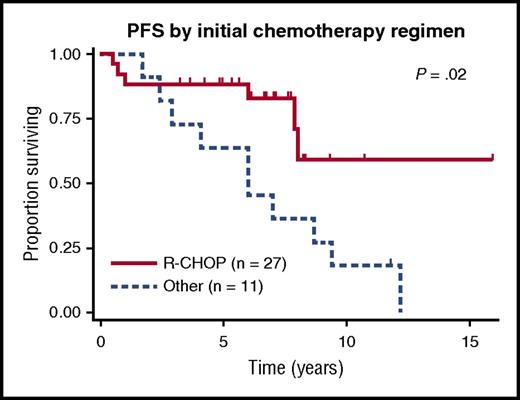In this issue of Blood, Fanale and colleagues report promising treatment results for patients with newly diagnosed nodular lymphocyte-predominant Hodgkin lymphoma (NLPHL) receiving R-CHOP (rituximab, cyclophosphamide, doxorubicin, vincristine, prednisone) (see figure).1
Comparison of progression-free survival (PFS) after R-CHOP and alternative chemotherapy protocols. See Figure 1A in the article by Fanale et al that begins on page 472.
Comparison of progression-free survival (PFS) after R-CHOP and alternative chemotherapy protocols. See Figure 1A in the article by Fanale et al that begins on page 472.
The rare histologic subtype of NLPHL accounts for ∼5% of all Hodgkin lymphoma (HL) cases. Unlike the disease-defining Hodgkin and Reed-Sternberg cells in classical HL, the malignant lymphocyte predominant cells in NLPHL stain consistently positive for CD20 but are negative for CD30. Clinically, NLPHL is characterized by a rather indolent course. However, there is a tendency toward late relapses and histologic transformation into aggressive B-cell non-Hodgkin lymphoma (B-NHL).2-4
Fanale and colleagues report a retrospective analysis including a total of 27 NLPHL patients (stage I/II: 11 patients; stage III/IV: 16 patients; concurrent aggressive B-NHL: 4 patients) who had R-CHOP as first-line treatment. A median of 6 (range: 4-8) cycles were given. Seven patients had consolidating radiotherapy (RT). All patients responded to treatment; the complete remission rate was 89%. After a median follow-up of 6.6 years, the 5-year PFS estimates were 88.5% for all patients, 91.3% for patients without concurrent diagnosis of aggressive B-NHL, and 85.3% for patients with stage III/IV disease. There were no cases of histologic transformation into aggressive B-NHL.
Patients with early-stage NLPHL, who represent the majority of cases, have an excellent long-term prognosis after RT alone (stage IA without risk factors) or combined-modality treatment consisting of a brief chemotherapy with ABVD (doxorubicin, bleomycin, vinblastine, dacarbazine) followed by RT (early stages other than stage IA without risk factors).5,6 In contrast, the optimal approach for advanced NLPHL is undefined. Treatment with ABVD was shown to be associated with an unacceptably high 10-year rate for disease recurrence or histologic transformation into aggressive B-NHL of ∼40%.7 Therefore, alternative options are required for this patient group.
Because of an overall response rate of 100% after single-agent anti-CD20 antibody treatment with rituximab and the clinical similarity to indolent B-NHL, R-CHOP was considered to be a promising alternative to ABVD.8,9
The present analysis by Fanale and colleagues included a larger series of NLPHL patients receiving first-line treatment with R-CHOP. The reported 5-year PFS rates with this protocol were excellent. No patient developed histologic transformation into aggressive B-NHL. However, PFS and transformation rates have to be interpreted with caution because the median follow-up of 6.6 years is not sufficient for definitive conclusions. According to an analysis by the German Hodgkin Study Group evaluating characteristics and outcome of relapsed NLPHL, the median time from initial diagnosis to disease recurrence was 6.2 years.10 Similarly, a Canadian report on histologic transformation in NLPHL patients revealed a median time to transformation of 8.1 years.3
Nonetheless, the use of R-CHOP optionally followed by RT in newly diagnosed advanced NLPHL is supported by the results from the present study despite all limitations associated with retrospective analyses and indirect comparisons. The R-CHOP protocol appears to be more effective than ABVD and less toxic than BEACOPP (bleomycin, etoposide, doxorubicin, cyclophosphamide, vincristine, procarbazine, prednisone) and thus has a more favorable risk-benefit ratio than these regimens.4,7 In contrast, patients with early-stage NLPHL are usually not candidates for R-CHOP treatment because they have an excellent outcome after RT alone (stage IA without risk factors) or a brief ABVD-based chemotherapy followed by RT (early stages other than stage IA without risk factors).5,6
Conflict-of-interest disclosure: The authors declare no competing financial interests.

